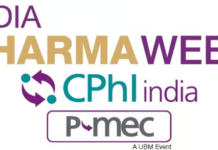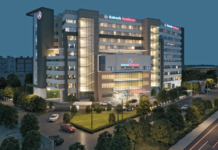First ECMO in Bengaluru for respiratory indication in a newborn and third in India
~Plans to establish a ‘Respiratory ECMO Centre’ in Narayana Health City, Bengaluru~
Bengaluru, March 24, 2017: A newborn child, weighing 3.2 kilos, was delivered by cesarean section at a local hospital near Hosur and referred to Narayana Health City, with breathing difficulty. The baby had passed meconium (baby’s first stool) within the womb of the mother, and had inhaled this meconium into its lungs. This resulted in severe breathing difficulty in the baby, which is known as Meconium Aspiration Syndrome (MAS). Chest X-rays also showed features of severe meconium aspiration.
The baby was put on ventilator support immediately, and administered a gas called nitric oxide, to decrease the lung pressure. However despite maximal medical therapy, the baby’s condition continued to deteriorate, due to low oxygen levels and low blood pressure (a condition known as cardiorespiratory failure). On the fourth day, as a final life-saving measure, the newborn was supported by Extracorporeal Membrane Oxygenation (ECMO).
ECMO is the use of an artificial lung (membrane), located outside the body (extracorporeal) that puts oxygen into the blood (oxygenation) and continuously pumps this blood into and around the body.
ECMO is a very expensive treatment and the cost of ECMO for this child was subsidized at Narayana Health City. “We have a lot of experience at Narayana with cardiac patients and because we have that much of experience, we’re extending that expertise now to a second group of patients – that’s respiratory”, said Dr. Rajiv Aggarwal, Senior Consultant Neonatologist & Head of the Pediatric Department at Narayana Health City. “And because we have such a big cardiac unit, we can actually subsidize or take care of the cost, because if an individual centre was to be started only for respiratory indications, the cost of setting up an ECMO is horrendous. The only way you can set-up an ECMO is in conjunction with a cardiac centre and not in isolation”, he explained.
According to medical literature, 10-15% of all neonates are born through meconium stained liqour (MSL). 10-15% of them become critically ill, a condition called meconium aspiration syndrome (MAS). 10% of newborns with MAS, despite conventional management, have fatal outcomes. Internationally, in this sub group, by using ECMO the survival rate has been shown to be over 90%.
Narayana Health City has had experience with more than 500 ECMO’s in the past 10 years, out of which two-thirds have been pediatric ECMO’s.“We have successfully supported many neonates with ECMO in the past, but all of them were for reversible heart failure, following congenital open heart surgery. This was the first time a neonate had been supported by ECMO for respiratory failure,” said Dr. Riyan Shetty, Head of Extracorporeal Life Support (ECLS) at Narayana Health City.
ECMO in newborns is a high risk procedure. It requires a multidisciplinary team of highly skilled medical professionals. “In the case of our newborn, after receiving parental consent, ECMO was instituted through cannulation of the neck vessels by an experienced pediatric cardiac surgeon. The lungs and heart were rested. The extracorporeal circuit maintained the baby’s heart, lungs and other organ functions. In 85 hours, the newborns lungs recovered, the ECMO was weaned and the baby was gradually taken off of the ventilator”, explained Dr. Riyan. The baby continued to show improvement and was finally discharged within three weeks of being admitted.
As the ECMO is instituted using the neck vessels, the procedure is less invasive. The length of hospital stay, cost and morbidity to the newborn is less when compared to opening the chest to cannulate. This kind of expertise is brought in by Dr Sudesh Prabhu, who is a Consultant in Pediatric Cardiac Surgery at Narayana Health City in Bengaluru.
ECMO can take over the functions of both the heart and the lungs, thus maintaining blood and oxygen supply to rest of the body. “In the case of this newborn, he had very low levels of oxygen due to meconium aspiration into his lungs. Due to low levels of oxygen, his heart was not working well either. As soon as we instituted ECMO, both the oxygen level and his heart function improved dramatically. The lungs recovered after 3 days of rest, whilst on ECMO”, explained Dr. Riyan Shetty.
Narayana Health City has a level-4 NICU (neonatal intensive care unit), fully equipped to treat extremely small babies weighing up-to 600 grams including the most complex cases of newborn surgery. “The NICU has an experienced team to manage everything for a newborn. Managing a newborn baby has multiple aspects such as feeding, nutrition, infection and so on, which is very well handled by us. We have an A-grade team of doctors and nurses to give all the support round the clock throughout the year”, affirmed Dr. Harini, Consultant Neonatologist at Narayana Health City.
Narayana Health City is well-equipped with the right infrastructure and a well- trained multidisciplinary medical team, to manage cases of meconium aspiration. In severe forms, the standard treatment is artificial ventilation and nitric oxide. Nitric oxide is available in only a few hospitals in Bengaluru. One in every 10 severe cases requires ECMO support, which is only offered at Narayana Health City in Bengaluru.
Corporate Comm India(CCI Newswire)





















